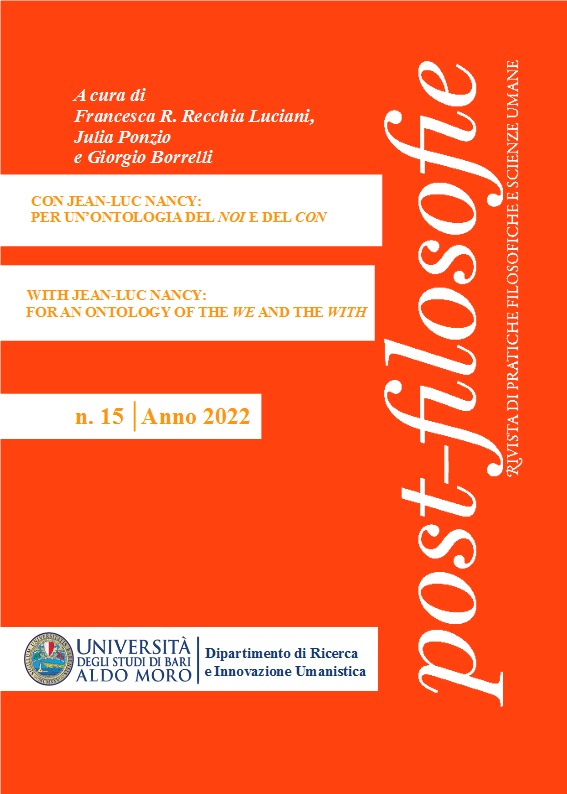Jean-Luc Nancy: de la guerra a la necesidad de una nueva ontología política
DOI:
https://doi.org/10.15162/1827-5133/1830Parole chiave:
Comunità, Economia, Guerra, Jean-Luc Nancy, Ontologia politica, Community, Economy, Political Ontology, War, Comunidad, Economía, Ontología políticaAbstract
El artículo examina el argumento que sustenta tanto la guerra identitaria de los Balcanes como la guerra económica de Irak, esto es, que si lo que estorba a la realización de la unidad planetaria, debe procederse a la limpieza étnica y a la exterminación sistemática de la pluralidad. En respuesta a la totalización de estas figuras político filosóficas, la ontología de la comunidad de Nancy elicita una renovación en la comprensión de lo político y lo ontológico, al echar sus raíces en las modalidades concretas de comunicación y exposición entre seres finitos.
The article examines the argument that underpins both the identity war in the Balkans and the economic war in Iraq and, in other words, if what is in the way of the realization of planetary unity, should be ascribed to the ethnic cleansing and the systematic extermination of plurality. In response to the totalization of these political-philosophical figures, Nancy’s ontology of community elicits a renewal in the understanding of the political and the ontological by rooting in the concrete modalities of communication and exposure among finite beings.
Riferimenti bibliografici
ARMSTRONG PH., Reticulations. Jean-Luc Nancy and the Networks of the Po-litical, University of Minnesota Press, Minneapolis 2009.
BADIOU A., Filosofía del presente, Capital intelectual, Bs. Aires 2010.
BERKMAN D. y D. COHEN-LEVINAS , (EDS.), Figures du dehors. Autour de Jean-Luc Nancy, Nantes 2012.
HEIDEGGER M., Caminos de bosque, Alianza, Madrid 1995.
―, Hitos, Alianza, Madrid 2007.
HUTCHENS B. C., Jean-Luc Nancy and the Future of the Philosophy, McGill-Queens University Press, Montreal & Kingston 2005.
NANCY J.-L., Corpus, Métailié, Paris 2000.
―, Identité. Fragments, franchises, Galilée, París 2010.
―, La Création du monde ou la mondialisation, Galilée, Paris 2002.
―, La comparution, Cristian Bourgois Editeur, Paris 2007.
―, La pensé dérobée, Galilée, Paris 2001.
―, La verité de la démocratie, Galilée, Paris 2008.
―, Les muses, Galilée, Paris 2001.
―, Le sens du monde, Galilée, Paris 1993.
―, Ser singular plural, Arena Libros, Madrid 2006.
―, Un pensamiento finito, Anthropos, Barcelona 2002.
NANCY J.-L., PH. LACOUE-LABARTHE, Le mythe nazi, Editions de l’Aube, La Tour-d’Aigues 1991.
WATKIN C., Difficult Atheism: Post-Theological Thinking in Alain Badiou, Jean-Luc Nancy and Quentin Meillassoux, Edinburgh University Press, Edinburgh 2011.
Downloads
Pubblicato
Fascicolo
Sezione
Licenza
“Post-Filosofie” utilizza Open Journal Systems 2.4.8.5, che è un software open source per la gestione e la pubblicazione di riviste sviluppato, supportato e distribuito gratuitamente dal Public Knowledge Project sotto la GNU General Public License.
Gli autori che pubblicano su questa rivista accettano le seguenti condizioni:
- Gli autori mantengono i diritti sulla loro opera e cedono alla rivista il diritto di prima pubblicazione dell'opera, contemporaneamente licenziata sotto una Licenza Creative Commons - Attribuzione che permette ad altri di condividere l'opera indicando la paternità intellettuale e la prima pubblicazione su questa rivista.
- Gli autori possono aderire ad altri accordi di licenza non esclusiva per la distribuzione della versione dell'opera pubblicata (es. depositarla in un archivio istituzionale o pubblicarla in una monografia), a patto di indicare che la prima pubblicazione è avvenuta su questa rivista.
- Gli autori possono diffondere la loro opera online (es. in repository istituzionali o nel loro sito web) prima e durante il processo di submission, poichè può portare a scambi produttivi e aumentare le citazioni dell'opera pubblicata (Vedi The Effect of Open Access).
"Post-Filosofie" uses Open Journal Systems 2.4.8.5, which is an open source journal management and publication software developed, supported and distributed free of charge by the Public Knowledge Project under the GNU General Public License.
Authors publishing in this journal accept the following conditions:
- Authors retain the rights to their work and assign to the journal the right of first publication of the work, simultaneously licensed under a Creative Commons Licence - Attribution that allows others to share the work indicating intellectual authorship and first publication in this journal.
- Authors may enter into other non-exclusive licensing agreements to distribute the published version of the work (e.g., deposit it in an institutional repository or publish it in a monograph), as long as they indicate that the first publication was in this journal.
- Authors may disseminate their work online (e.g. in institutional repositories or on their website) before and during the submission process, as it may lead to productive exchanges and increase citations of the published work (See The Effect of Open Access).







